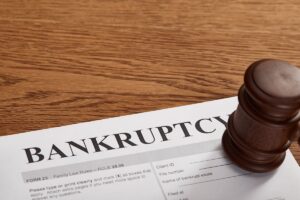 Many Texans who begin a Chapter 13 repayment plan have every intention of completing it. Yet life doesn’t always cooperate. A sudden job loss, medical crisis, or family emergency can make monthly payments impossible.
Many Texans who begin a Chapter 13 repayment plan have every intention of completing it. Yet life doesn’t always cooperate. A sudden job loss, medical crisis, or family emergency can make monthly payments impossible.
What few debtors realize is that federal law provides a narrow but powerful option called a Chapter 13 hardship discharge, which is a way to erase qualifying debts when completing the repayment the plan truly can’t be done.
Let’s understand how Chapter 13 hardship discharge works, who qualifies, and why consulting an experienced Texas bankruptcy lawyer is essential.
Understanding Chapter 13 Bankruptcy
Chapter 13 bankruptcy involves a court-supervised repayment plan that typically lasts three to five years. Instead of liquidating assets, you reorganize your debt, work out new payment arrangements, and make regular payments to the bankruptcy trustee based on your income and living expenses. Chapter 13 allows homeowners to keep property, catch up on mortgages and other financial arrearages, and pay creditors in an orderly way.
For example, a Dallas family behind on mortgage payments might use Chapter 13 to stop foreclosure and repay arrears over time. But if a wage earner becomes permanently disabled or loses employment mid-plan, continuing may be impossible. That’s where the hardship discharge can help.
What Is a Chapter 13 Hardship Discharge?
A hardship discharge is a court-approved release from remaining debts when a debtor cannot complete the plan due to circumstances beyond their control. It’s sometimes called a partial discharge because it ends the case early without full repayment.
To qualify, three conditions must be met:
- An inability to make payments is caused by events the debtor could not prevent, such as serious illness, permanent disability, or involuntary job loss.
- Creditors have already received at least what they would have gotten in a Chapter 7 bankruptcy liquidation.
- The debtor must demonstrate that they did everything reasonably possible to complete the plan but could not.
When granted, a Chapter 13 hardship discharge functions similarly to a Chapter 7 discharge and applies only to debts eligible under that chapter.
When You May Qualify for a Hardship Discharge
Courts evaluate hardship requests carefully. Typical qualifying scenarios include:
- A long-term illness or injury that prevents continued employment
- The death or incapacity of a household income earner
- Major, unexpected financial changes that make modification impossible
The hardship must be permanent, not temporary, and you must show a good-faith effort throughout the case.
For instance, if a self-employed mechanic suffers a disabling injury and can no longer work, the court may find that repayment is no longer feasible. A well-documented petition from your attorney demonstrating both cause and fairness is key to approval.
Which Debts Are Covered—and Which Are Not
A hardship discharge erases most unsecured debts, such as credit-card balances, medical bills, and personal loans—similar to Chapter 7 rules. However, certain obligations cannot be discharged:
- Child support and alimony
- Student loans (unless a rare undue-hardship exception applies)
- Certain recent tax debts
- Secured debts tied to property you keep, such as a car or home lien
Regarding liens, if you keep the property that secures a loan, the lien survives even though your personal liability may be reduced, which means that the property can be repossessed by the lender.
How a Texas Bankruptcy Lawyer Can Help
An experienced bankruptcy attorney in Texas plays a crucial role in evaluating whether you meet hardship criteria. Your lawyer can gather evidence, prepare the motion, and present it to the court.
Timing is critical—acting before the case is dismissed keeps your right to seek discharge intact. If a hardship discharge is not feasible, your attorney can explore alternatives such as modifying your plan or converting the case to Chapter 7.
Proper guidance protects your rights and maximizes your chance for meaningful relief.
Read Also: When Creditors Don’t Comply With Bankruptcy Discharge Rules
Take Action Today to Explore Your Options
A Chapter 13 hardship discharge can offer lifesaving relief when circumstances make repayment impossible. It’s not widely known, but for qualifying Texans, it can mean the difference between endless debt and a fresh start.
At the Law Office of Carrie L. Weir, we’ve helped clients across Rockwall, Kaufman, Dallas, Collin, and surrounding counties navigate complex bankruptcy issues with clarity and compassion.
Contact us online or call 972-772-3083 to schedule your free consultation. Discover whether a hardship discharge—or another legal strategy—can help you regain financial stability.







